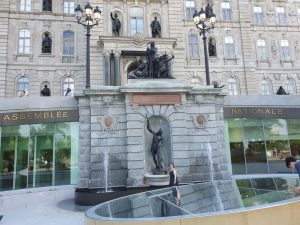
At present we are on a rewarding and thought-provoking research trip to North America, and have concluded that we academic lawyers definitely need to get out more. We are currently writing a book about States, nations, identity and human rights, with a particular focus on Scotland, Catalonia and Quebec, and as a result, we have spent the past few months chipping away at a mountain of books, articles, blogs and other material about Francophone America. Although this reading has been engaging and unquestionably interesting, we haven’t been in a position to even begin to understand the subject until we have arrived and started meeting people. Of course, we are not claiming to have suddenly become experts of a new context, with a nuanced cultural understanding in the course of a week (to be truthful, we still haven’t even completely figured out how the pedestrian crossings work, so are hardly in a position to claim to have achieved dizzying heights of perception). Nevertheless, in having had the privilege of coming to Quebec City and speaking with the people who live and work here, we have at least touched the heart and soul which lie behind the juridical debates.
A number of academic lawyers and politicians have been incredibly generous with their time, and their willingness to share their thoughts and personal perspective with us has been humbling. We are particularly grateful to Martin Blanchette, Jean-Pierre Derriennic, Veronique Hivon, Guillaume Rousseau and Patrick Taillon in this respect, as their various insights and viewpoints have already greatly enriched out work. The truth is that legal debates, especially those which collide with political and social ones, cannot be explored without an awareness of the human motivations which lie behind them. Even though this is the case in all contexts, it is even more significant when dealing with matters like identity and belonging. In that setting, law does not just enshrine abstract principles to enable functional goals to be met, but it encapsulates values, culture and priorities. The narratives flowing through legal instruments and documents, whether as reasons for embracing or rejecting the same, are not just about expediency.
It should also be observed that these narratives are invariably deeply rooted, and it is vital to peel back the past in order to understand the present. In this regard, we are indebted also to Peter Gagne at the archives of the Musee de l’Amerique Francophone, located within Laval University, as his help in accessing some of the sources provided us a gateway into the past which was hugely appreciated. This museum itself is also a must see for anyone fortunate enough to visit Quebec city, as the past story of French speaking peoples in America is not as widely told as it should be in either English or Spanish speaking culture.
Certainly, we are very grateful for Francophone Canada in the present day. Quebec city was an inspirational blend of European and North American culture, as well as being most welcoming to visitors. We were fortunate to learn a considerable amount from the exchanges which we had planned, but we also had interesting conversations in shops, restaurants and parks, all of which added to the mosaic of understanding we are slowly and happily building up.
Our visit to Quebec included all kinds of new experiences, from being repeatedly outwitted by highly photogenic groundhogs, to discovering poutine. These incidents and experiences all mattered, in coming encountering a new environment and its people. Ultimately, law is a tool, or a means to regulate society according to the common values of a community. The usefulness of a tool in this sense, can only be assessed in light of the community which it is serving. Consequently, we are committed to the idea that lawyers must spend time getting to know and understand the social settings which form the backdrop of their deliberations.


